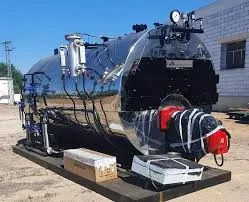
Okt . 12, 2024 06:22 Back to list
Understanding the Operation and Maintenance of High Pressure Boilers for Efficient Performance
High Pressure Boilers An Overview
High pressure boilers play a vital role in various industrial applications, providing steam for power generation, heating, and other processes. A high pressure boiler is generally defined as one that operates at a pressure above 15 psi (pounds per square inch), though many industrial applications operate at pressures far exceeding this threshold. Understanding the design, operation, and safety aspects of high pressure boilers is crucial for professionals in the field.
Design and Construction
High pressure boilers are designed to withstand the rigorous conditions of high-pressure operation. They typically consist of a pressure vessel, burner system, and auxiliary components such as economizers and superheaters. The materials used in construction must exhibit excellent strength and corrosion resistance, often necessitating the use of special alloys or treated steels. The primary function of the boiler is to convert water into steam through the injection of thermal energy, which is typically derived from the combustion of fossil fuels, biomass, or through electrical means.
Boiler design may vary based on the intended application. For instance, water-tube boilers are commonly used in high pressure contexts due to their ability to handle higher pressure and temperature conditions, while fire-tube boilers are generally limited to lower pressure applications. The choice between different types depends on efficiency, output requirements, and the fuel type available.
Operation Principles
The operation of high pressure boilers revolves around the principles of thermodynamics. Water is heated in the boiler under pressure, which raises its boiling point. As the water transforms into steam, this high-energy steam can then be directed to various systems, such as turbines for electricity generation or directly into industrial processes for heating purposes.
The efficiency of a high pressure boiler is significantly impacted by the quality of the combustion process. A well-designed burner system ensures optimal fuel-air mixing for efficient combustion, minimizing unburned fuel and reducing emissions. Additionally, components like economizers recover residual heat from flue gases, enhancing overall system efficiency.
high pressure boilers pdf

Safety Considerations
Given the inherent risks associated with high pressure systems, safety is a paramount concern in the operation of these boilers. Regular maintenance and rigorous safety checks are necessary to ensure that all components are functioning correctly. Safety features such as pressure relief valves, automatic shut-offs, and robust monitoring systems are integral to preventing hazardous situations, including explosions.
Operators are required to hold specific certifications and undergo training to understand the complexities involved in managing high pressure systems. Ensuring that personnel are well-informed and trained can significantly mitigate the risks associated with boiler operation.
Regulatory Compliance
High pressure boilers are subject to various codes and regulations aimed at ensuring safe operation. In the United States, the American Society of Mechanical Engineers (ASME) sets the standards for boiler design and manufacture. Additionally, local and state regulatory bodies may have their own specific requirements, including regular inspections and certifications.
Compliance with these regulations not only enhances safety but also contributes to the overall efficiency and reliability of the boiler system. Non-compliance can result in significant legal and financial repercussions, underscoring the importance of adherence to established guidelines.
Conclusion
High pressure boilers are indispensable in many industrial settings, offering a reliable source of steam for a variety of applications. However, their operation is complex and requires a strong emphasis on design, safety, and regulatory compliance. Understanding the intricacies of high pressure boilers allows professionals in the field to optimize their performance while minimizing risks. Continued advancements in boiler technology and safety protocols will further enhance the efficiency and reliability of these essential systems in the future. As industries evolve and strive for more energy-efficient solutions, high pressure boilers will undoubtedly remain a key component in meeting these new demands.
-
High-Efficiency Commercial Oil Fired Steam Boiler for Industry
NewsJul.30,2025
-
High-Efficiency Biomass Fired Thermal Oil Boiler Solutions
NewsJul.30,2025
-
High Efficiency Gas Fired Thermal Oil Boiler for Industrial Heating
NewsJul.29,2025
-
High-Efficiency Gas Fired Hot Water Boiler for Sale – Reliable & Affordable
NewsJul.29,2025
-
High Efficiency Biomass Fired Hot Water Boiler for Industrial and Commercial Use
NewsJul.29,2025
-
High-Efficiency Biomass Fired Hot Water Boiler for Industrial Use
NewsJul.28,2025
Related PRODUCTS






















